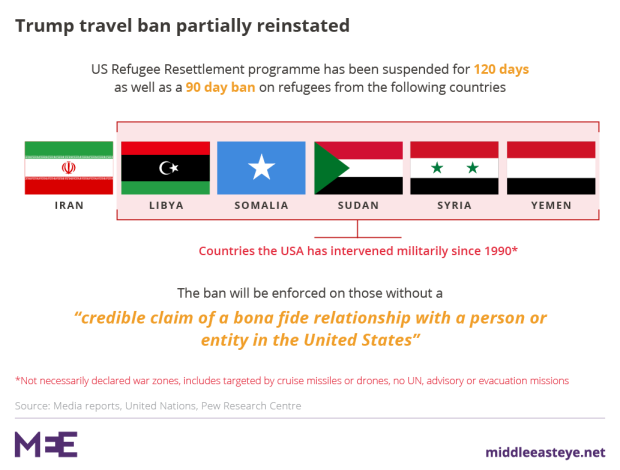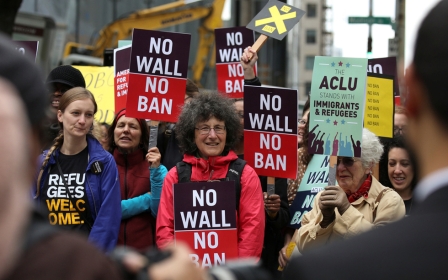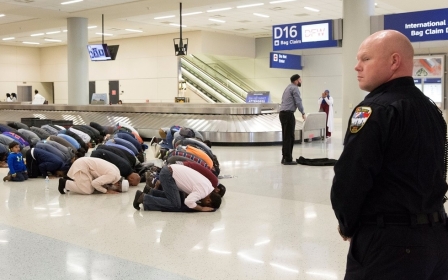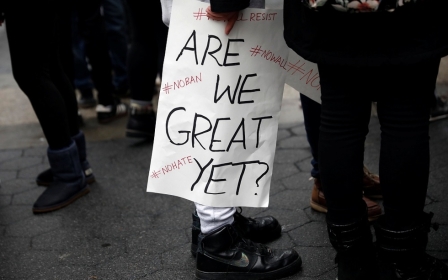US Supreme Court partially revives Trump's Muslim ban
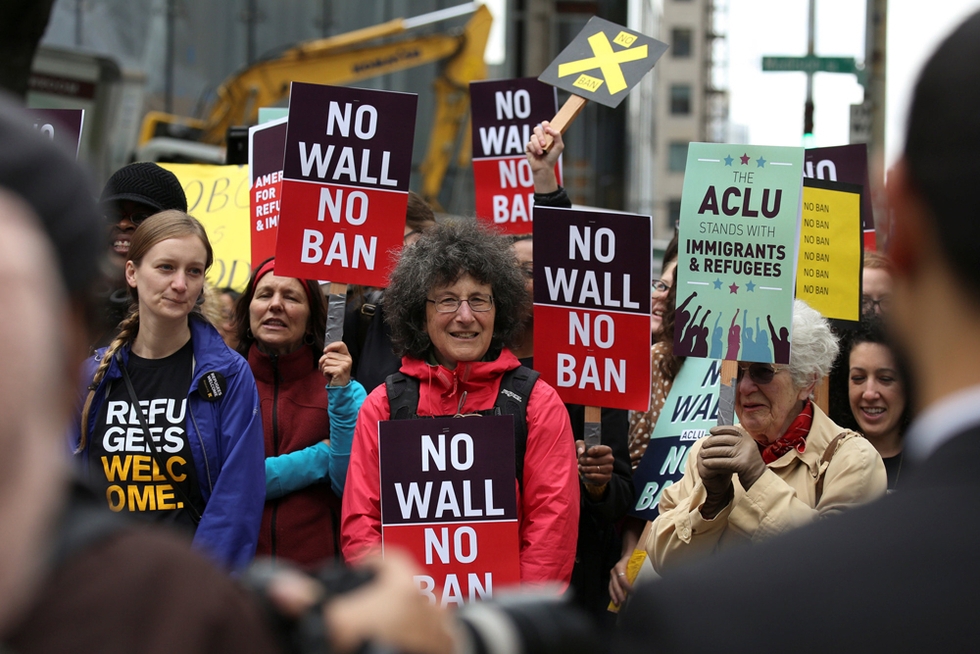
The US Supreme Court on Monday handed a victory to Donald Trump by narrowing the scope of lower court rulings that blocked his travel ban on people from six Muslim-majority countries and agreeing to hear his appeals in the cases.
The court said it would hear arguments on the legality of one of the US president's signature policies in his first months in office in the court's next term, which starts in October.
The justices granted parts of his administration's emergency request to put the 6 March executive order into effect immediately while the legal battle continues. The court also said it would partly allow a 120-day ban on all refugees entering the United States to go into effect.
The court said the ban will apply "to foreign nationals who lack any bona fide relationship with a person or entity in the United States".
Hawaii's attorney general, Douglas Chin, who successfully challenged the ban in lower courts, said that students from affected countries due to attend the University of Hawaii would still be able to do so.
The ban will partly go into effect 72 hours after the court's decision. The Department of Homeland Security promised clear and sufficient public notice in coordination with the travel industry
The supreme court left the lower-court injunctions against the ban in place, but only with respect to the challengers of the ban themselves and others in similar circumstances, meaning they involve people in the US who have relationships with foreign nationals abroad and whose rights might be affected if those foreigners were excluded from entry.
But the court said the injunctions were too broad to also include barring enforcement of the ban against foreigners who have no connection to the United States at all.
"Denying entry to such a foreign national does not burden any American party by reason of that party's relationship with the foreign national," the court said.
The Council on American-Islamic Relations (CAIR) slammed the court's decision, saying that it "ignores the Islamophobic origins of the policy and emboldens Islamophobes in the Trump administration".
The rights group noted that reinstating parts of the “Muslim ban” is particularly “disturbing” as it coincides with the Eid al-Fitr Muslim holiday.
Nihad Awad, CAIR national executive director, said in a statement that the ruling has opened the door "to legal chaos and official overreach in embassies and at the border" in terms of determining who has a "bona fide" connection to the US.
'Can the president do this?'
Palestinian American comedian Amer Zahr, who is also an adjunct professor at University of Detroit-Mercy Law School, played down the significance of Monday’s ruling.
He said Trump may cast the Supreme Court’s decision as a win because he had lost every legal battle challenging his executive order, but the majority of people targeted by the ban remain protected from its effects.
“It’s much less of a big deal than everybody is making it to be,” Zahr told Middle East Eye.
Hours after the ruling, Trump sent out a celebratory tweet thanking the Supreme Court.
Zahr explained those who do not have connections to the United States are a small percentage of the types of plaintiffs who are suing the US government over the ban.
He said the bigger question will be whether the court considers the ban constitutional when it reconvenes in the fall. “Can the president do this? And can his statements from Twitter and the campaign season be brought in as proof of his intent that he wanted to ban Muslims, which would be illegal under the constitution.”
In December 2015, Trump called for "a total and complete shutdown of Muslims entering the United States". Those challenging the travel ban argue that it is discriminatory, citing Trump's statements when he was a candidate.
The Arab American Institute (AAI), a Washington-based think tank, said the decision is disappointing, "but it does not mean that bigotry has won the day".
'Unconstitutional'
AAI said it disagrees with the Supreme Court's ruling to allow the White House to block vulnerable refugees. But it added that the court made an important distinction by keeping the stay against the ban for people who have ties to the US.
"Once a full hearing occurs, we are confident that the Supreme Court will find that the ban is unconstitutional and discriminatory as it is designed to prohibit the entry of individuals based on their faith, in this case Muslims, just as President Trump said multiple times on the campaign trail," AAI said in a statement.
Three of the court's conservatives said they would have granted Trump's request in full, including Trump appointee Neil Gorsuch.
The case is Trump's first major challenge at the Supreme Court, where he restored a 5-4 conservative majority with the appointment of Gorsuch, who joined the bench in April. There are five Republican and four Democratic appointees on the court.
The 6 March order called for a 90-day ban on travellers from Libya, Iran, Somalia, Sudan, Syria and Yemen and a 120-day ban on all refugees entering the United States to enable the government to implement stronger vetting procedures. It was blocked by federal judges before going into effect on 16 March as planned.
Critics have called the order a mean-spirited, intolerant and un-American "Muslim ban".
The state of Hawaii and a group of plaintiffs in Maryland represented by the American Civil Liberties Union argued that the order violated federal immigration law and the Constitution's First Amendment prohibition on the government favouring or disfavouring any particular religion.
Regional federal appeals courts in Virginia and California both upheld district judge injunctions blocking the order.
The administration has said the travel ban is needed to allow time to implement stronger vetting measures, although it has already rolled out some new requirements not blocked by courts, including additional questions for visa applicants.
Middle East Eye propose une couverture et une analyse indépendantes et incomparables du Moyen-Orient, de l’Afrique du Nord et d’autres régions du monde. Pour en savoir plus sur la reprise de ce contenu et les frais qui s’appliquent, veuillez remplir ce formulaire [en anglais]. Pour en savoir plus sur MEE, cliquez ici [en anglais].


